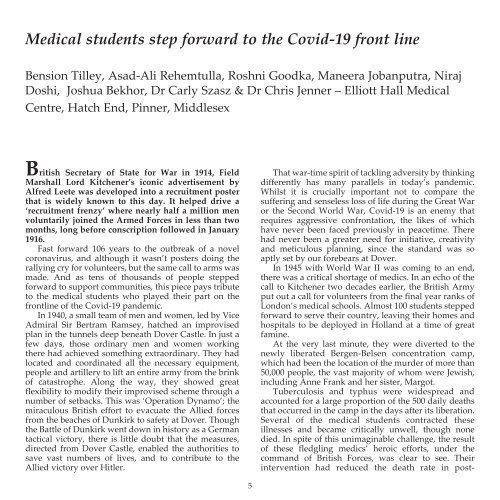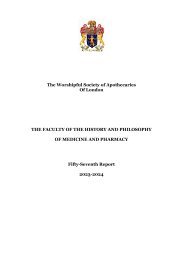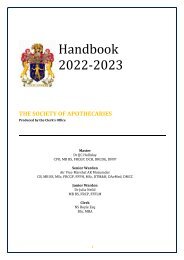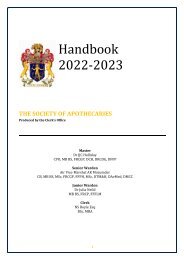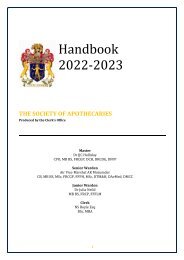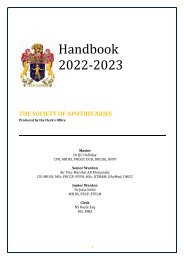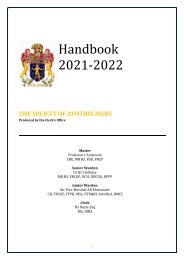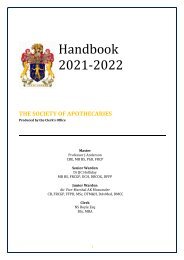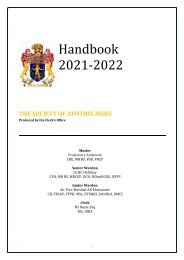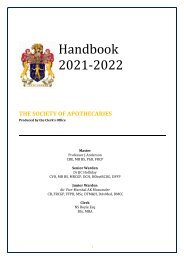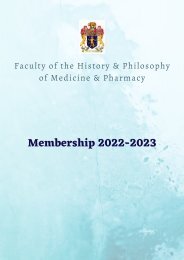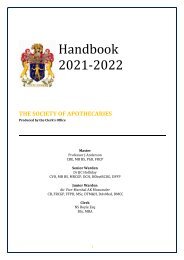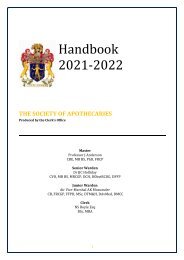Apothecary 2020
Journal of the Worshipful Society of Apothecaries for Master's Year 2019-20
Journal of the Worshipful Society of Apothecaries for Master's Year 2019-20
You also want an ePaper? Increase the reach of your titles
YUMPU automatically turns print PDFs into web optimized ePapers that Google loves.
Medical students step forward to the Covid-19 front line<br />
Bension Tilley, Asad-Ali Rehemtulla, Roshni Goodka, Maneera Jobanputra, Niraj<br />
Doshi, Joshua Bekhor, Dr Carly Szasz & Dr Chris Jenner – Elliott Hall Medical<br />
Centre, Hatch End, Pinner, Middlesex<br />
British Secretary of State for War in 1914, Field<br />
Marshall Lord Kitchener’s iconic advertisement by<br />
Alfred Leete was developed into a recruitment poster<br />
that is widely known to this day. It helped drive a<br />
‘recruitment frenzy’ where nearly half a million men<br />
voluntarily joined the Armed Forces in less than two<br />
months, long before conscription followed in January<br />
1916.<br />
Fast forward 106 years to the outbreak of a novel<br />
coronavirus, and although it wasn’t posters doing the<br />
rallying cry for volunteers, but the same call to arms was<br />
made. And as tens of thousands of people stepped<br />
forward to support communities, this piece pays tribute<br />
to the medical students who played their part on the<br />
frontline of the Covid-19 pandemic.<br />
In 1940, a small team of men and women, led by Vice<br />
Admiral Sir Bertram Ramsey, hatched an improvised<br />
plan in the tunnels deep beneath Dover Castle. In just a<br />
few days, those ordinary men and women working<br />
there had achieved something extraordinary. They had<br />
located and coordinated all the necessary equipment,<br />
people and artillery to lift an entire army from the brink<br />
of catastrophe. Along the way, they showed great<br />
flexibility to modify their improvised scheme through a<br />
number of setbacks. This was ‘Operation Dynamo’; the<br />
miraculous British effort to evacuate the Allied forces<br />
from the beaches of Dunkirk to safety at Dover. Though<br />
the Battle of Dunkirk went down in history as a German<br />
tactical victory, there is little doubt that the measures,<br />
directed from Dover Castle, enabled the authorities to<br />
save vast numbers of lives, and to contribute to the<br />
Allied victory over Hitler.<br />
That war-time spirit of tackling adversity by thinking<br />
differently has many parallels in today’s pandemic.<br />
Whilst it is crucially important not to compare the<br />
suffering and senseless loss of life during the Great War<br />
or the Second World War, Covid-19 is an enemy that<br />
requires aggressive confrontation, the likes of which<br />
have never been faced previously in peacetime. There<br />
had never been a greater need for initiative, creativity<br />
and meticulous planning, since the standard was so<br />
aptly set by our forebears at Dover.<br />
In 1945 with World War II was coming to an end,<br />
there was a critical shortage of medics. In an echo of the<br />
call to Kitchener two decades earlier, the British Army<br />
put out a call for volunteers from the final year ranks of<br />
London’s medical schools. Almost 100 students stepped<br />
forward to serve their country, leaving their homes and<br />
hospitals to be deployed in Holland at a time of great<br />
famine.<br />
At the very last minute, they were diverted to the<br />
newly liberated Bergen-Belsen concentration camp,<br />
which had been the location of the murder of more than<br />
50,000 people, the vast majority of whom were Jewish,<br />
including Anne Frank and her sister, Margot.<br />
Tuberculosis and typhus were widespread and<br />
accounted for a large proportion of the 500 daily deaths<br />
that occurred in the camp in the days after its liberation.<br />
Several of the medical students contracted these<br />
illnesses and became critically unwell, though none<br />
died. In spite of this unimaginable challenge, the result<br />
of these fledgling medics’ heroic efforts, under the<br />
command of British Forces, was clear to see. Their<br />
intervention had reduced the death rate in post-<br />
5


